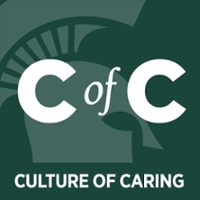Words of Wellness: Back in the Pool?
May 11, 2021 - Culture of Caring - Claudia Finkelstein

After a long year of change and adjusting to ever shifting goalposts of “the new normal” we seem to be heading out of the worst of it. There is cautious optimism about the months ahead based on current trends. Along with optimism, there is a vague pervasive anxiety about how to navigate the times ahead.
So many factors remain unknown and beyond our own control. If you think about it, this sums up our lives in general. The pandemic has just made it more obvious. It’s not a bad time to have a look at what lies within our control. It’s also a great time to look at what habits we have acquired that are worth hanging onto and which we wish to let go of.
I haven’t heard anyone complain about spending less time in the car. The hours spent commuting have been devoted by some to working out, meditating, spending time with family, cooking and so on. The decreased commute has also improved pollution standards, while decreasing traffic and noise. So, we may consider as individuals and as a workplace, how crucial it is to be physically present day by day, meeting by meeting. Of course, some functions (think SIM lab, or bench research) must be done in person. Surely, there are gains and losses with remote work and each may vary by individual. It may not be possible to have your ideal situation, but it’s certainly worth thinking it through.
We have had daily reminders of how precious and fleeting our lives are. What if we used these reminders to prioritize our actions? It’s sometimes useful to pause and ask ourselves “Is this really how I wish to be spending my time right now?” Some find it beneficial to put a sticky note on their phone or TV remote to remind themselves to ask the question.
This isn’t an exhaustive list. It’s merely an example of things to ponder when deciding what re-entry will look like for you. I’m saddened to hear that sales of SPANX are on the rise as re-opening looms. I hope we can steer clear of opportunists trying to make us feel better about re-entry by selling superficial solutions. This is a time worthy of reflection and choice.
There has been a lot written about mental health during the pandemic. It would be a tragic waste to relegate mental health issues back to stigmatized obscurity. Especially during May, which is Mental Health Awareness Month knowing about warning signs of distress in yourself, or others, is vital. Remember that you can text or call for help if you or a friend are suicidal using the resource list below. Even better, know that you or your friend can reach out for help for other mental health concerns too.
National Suicide Prevention Lifeline available 24 hours. 800-273-8255 Languages: English, Spanish. Learn more
Crisis Text Line | Text HOME To 741741 https://www.crisistextline.org
Crisis Text Line provides free, 24/7 support via text message. We're here for everything: anxiety, depression, suicide, school.
If you are interested in submitting a Culture of Caring essay, poem, article, or topic to explore, please send your ideas to finkel22@msu.edu for consideration.

